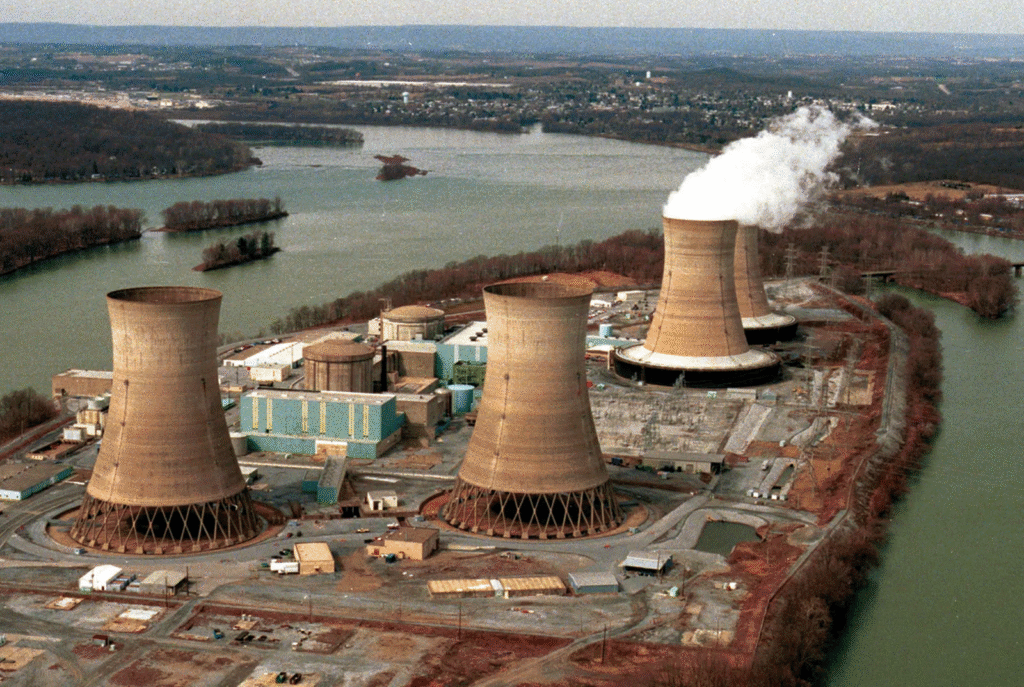Tech Giants Embrace Nuclear Energy to Meet AI Power Needs
With the rapid rise of artificial intelligence driving up global energy demands, leading technology firms are exploring sustainable power options, particularly in the realm of nuclear energy. Microsoft, Google, and Amazon have each revealed collaborations with energy companies that are investigating nuclear-based supply alternatives.
Microsoft has recently finalized an agreement to acquire power from the Three Mile Island reactor in Pennsylvania, a location known for being the site of the nation’s most notorious nuclear incident. This development highlights the ways in which technology companies are reevaluating conventional energy approaches to support the expansion of AI infrastructure.

Source: Britannica
The Aftermath of Nuclear Disasters Remains Ever-Present
The collective recollection of catastrophic events like Three Mile Island, Fukushima, and Chernobyl persistently influences views on nuclear energy. In 1979, a partial meltdown at Three Mile Island significantly eroded public trust in nuclear power in the United States.
Although there were no reported fatalities, the incident left a significant impact on the industry. Years later, that past continues to play a significant role in shaping both local and national resistance to new nuclear initiatives.
Small Modular Reactors Present Potential and Challenges
Big Tech’s latest ambition centers around small modular reactors, or SMRs compact nuclear systems that offer the potential for safer, more affordable energy solutions. These reactors operate at lower temperatures, which minimizes the chances of a meltdown and accelerates the construction process.
Nonetheless, specialists caution that the majority of small modular reactors are still in theoretical or experimental stages. Allison Macfarlane, the former chair of the U.S. Nuclear Regulatory Commission, points out that smaller reactor cores lack efficiency and are still years away from being commercially viable.
Recommended Article: Elon Musk Hires Nvidia Experts to Strengthen xAI World Models
Cost, Efficiency, and Scalability Remain Major Hurdles
Companies such as Kairos Power, in collaboration with Google, are working on small reactors designed to produce 50 megawatts by the year 2030. While the potential is evident, the results do not meet the substantial needs of AI-driven data centers.
Despite forecasts of a 10-fold increase in capacity by 2035, experts concur that nuclear energy will not suffice to address the immediate energy demands of AI. Traditional large reactors continue to benefit from economies of scale, outpacing smaller, modular alternatives.
Community Pushback Against Challenges to Plans for Nuclear Expansion
Local resistance poses a significant challenge to the implementation of nuclear energy throughout the United States. Residents of North Tonawanda, New York, have recently cast their votes to prohibit nuclear generation, following a series of protests against a cryptocurrency company that aimed to establish a small reactor in the area.
The public’s apprehension regarding noise, waste management, and radioactive contamination continues to be significant. Research from Stanford indicates that small modular reactors could generate a greater amount of waste for each unit of energy compared to conventional reactors, raising significant concerns.
Weighing the Advantages for the Environment Against the Dangers of Waste
In the face of potential dangers, nuclear energy presents a compelling case for carbon-free, round-the-clock power, highlighting its significant edge over fossil fuels. Tech companies contend that it has the potential to stabilize power grids and facilitate the growth of renewable energy by ensuring a reliable output.
Nevertheless, the issue of waste disposal continues to be a matter that lacks resolution. Recent data indicates a modest increase in American support for nuclear energy; however, broader acceptance hinges on the development of safer disposal methods and enhanced operational transparency.
The Future of AI Energy Relies on a Variety of Solutions
Authorities highlight that a singular energy source cannot satisfy the enormous power requirements of AI. The International Energy Agency has issued a warning that electricity consumption by data centers may potentially double in the next 5 years.
Researchers in the field are delving into advancements aimed at enhancing efficiency, such as the development of energy-optimized chips and the creation of more compact machine learning models. According to Microsoft, “There is no single technology or solution capable of driving global decarbonization.”















